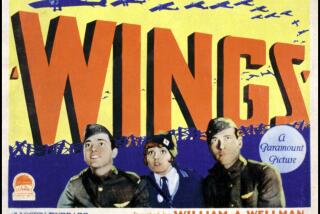‘Superman’ Star Christopher Reeve Dies
- Share via
Actor Christopher Reeve, the star of the “Superman” movies who became even more famous as an advocate for the disabled after he was paralyzed from the neck down in a 1995 horseback riding accident, died Sunday. He was 52
Reeve fell into a coma Saturday after going into cardiac arrest at his New York home, his publicist, Wesley Combs, told Associated Press late Sunday night.
Reeve recently had been being treated for a pressure wound, a common complication of paralysis, Combs said. The wound became infected and led to a systemic infection. Reeve was admitted to Northern Westchester Hospital on Saturday night and never regained consciousness. His family was at his side at the time of death.
“On behalf of my entire family, I want to thank Northern Westchester Hospital for the excellent care they provided to my husband,” Reeve’s wife, Dana, said in a statement. “I also want to thank his personal staff of nurses and aides, as well as the millions of fans from around the world who have supported and loved my husband over the years.”
A tall, dark-haired actor perfectly suited for the role of the “Man of Steel,” Reeve showed true fortitude as a quadriplegic who pledged he would one day walk again.
After his accident, Reeve soon became a powerful advocate for pushing the boundaries of modern medicine. His New Jersey-based Christopher Reeve Paralysis Foundation emerged under his star power and relentless fundraising as a leading source for research money, giving out more than $42.5 million to neuroscientists.
In recent days, his struggle became a reference point for Democratic presidential candidate Sen. John F. Kerry, who said in Friday’s debate that he believed embryonic stem cell research should be expanded, saying it would be the best way to give Reeve and others like him the chance for a better life.
“Chris Reeve is a friend of mine,” Kerry said. “Chris Reeve exercises each and every day to keep those muscles alive so that one day he can walk again, and I want him to walk again.”
Reeve was a frequent and forceful advocate for expanding embryonic stem cell research, and a critic of President Bush’s decision in 2001 to limit federal funding to existing stem cell lines. Even before that decision, Reeve, who could only speak briefly and haltingly because of his breathing tube, testified before the U.S. Senate on what he saw as perhaps his best hope for recovery.
In his statement to lawmakers he said: “While we prolong the stem cell debate, millions continue to suffer. We must harness the power of the government and go forward.”
Reeve, an accomplished horseman, broke the top two cervical vertebrae and injured his spinal cord when he was thrown from his horse and landed on his head during competitive trials at an event in Culpepper, Va.
At the time, doctors called the injury one of the worst possible. But Reeve, almost from the start, was determined to prove experts wrong. A few months after the accident, Reeve protested tabloid reports saying he had been pleading to die. “I have not given up. I will never give up,” he said.
After months of therapy, he was able to breathe for short periods without a respirator and began to lobby Congress for better insurance protection against life-changing injuries.
A year after his accident, Reeve accepted an invitation to at the Academy Awards despite the dangers he faced from airplane travel and his still-tenuous condition. He received a prolonged standing ovation from the gathered stars and brought many in the audience to tears with a plea for more films that address social problems.
“I think that setting challenges is a great motivator because too many people with disabilities allow that to become the dominating factor in their lives, and I refuse to allow a disability to determine how I live my life,” Reeve told The Times after his appearance. “I don’t mean to be reckless, but setting a goal that seems a bit daunting actually is very helpful toward recovery.”
Reeve crisscrossed the country with an entourage of nurses as an advocate for the disabled and handicapped, speaking to college students, actors and almost anyone who would listen.
Born Sept. 25, 1952, in New York City to journalist Barbara Johnson and writer and professor Franklin Reeve, Reeve began acting as a child and continued to perform professionally as he studied at Cornell University and then New York’s Juilliard School of Performing Arts.
In 1974, he began playing the role of Ben Harper in the television soap opera “Love of Life.” He took other small roles in television, theater and film, and in 1976 made his Broadway debut opposite Katherine Hepburn in “A Matter of Gravity.” While performing in another play in New York in 1976, Reeve auditioned for the role that would make him a star. With Marlon Brando playing his father and Gene Hackman as the evil Lex Luthor, Reeve’s “Superman” was a blockbuster when it was released in 1978, and Reeve became a household name.
During the 18 months he spent shooting the film, mostly in England, Reeve began a relationship with modeling executive Gae Exton, with whom he had two children.
Reeve returned to acting after the accident, and in 1997 made his directorial debut with the critically acclaimed film “In the Gloaming.”
With a long history of political activism, working on behalf of such groups as Amnesty International, Save the Children and the Natural Resources Defense League, however, he spent most of his time in his new role as an advocate. Among his numerous philanthropic pursuits, Reeve helped establish the Reeve-Irvine research center at UC Irvine College of Medicine.
In addition to his wife, Reeve is survived by their 12-year-old son, Will; two children from a previous relationship, Matthew, 25, and Alexandra, 21; his mother and father; and a brother, Benjamin Reeve.
*
Times staff writer Sue Fox contributed to this report.
More to Read
The biggest entertainment stories
Get our big stories about Hollywood, film, television, music, arts, culture and more right in your inbox as soon as they publish.
You may occasionally receive promotional content from the Los Angeles Times.










